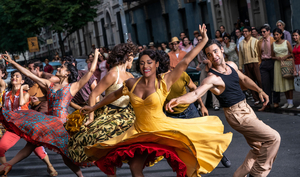
![]() Why remake (or even reimagine) a classic 60 years on? The question is surely better framed as why not?
Why remake (or even reimagine) a classic 60 years on? The question is surely better framed as why not?
Gone is much of the abstract artifice of Robert Wise's extraordinary Oscar-laden cinematic landmark and in come bulldozers clearing slums in order to build, well, New York landmarks. The shift is something akin to moving from a room in the MOMA full of Pollocks and Rothkos to one displaying the hyper-realism of the latest CGI gizmos. It's a little jarring (the overture is same after all) but Spielberg has laid down a marker - his imagination is gritty, grimy and grounded.
He stays true to that look as The Jets, all seething white entitlement, and The Sharks, all aspirant can-do served with a side order of immigrant pride, stake their claims to territory that is literally being swept from under their feet. Very few will not know what happens next.
Ansel Elgort is strangely subdued as Tony, initially disillusioned with The Jets after a year in prison - too much of that indifference clings to him when passion should overflow, both when meeting Maria and in avenging a comrade. Newcomer, Rachel Zegler, cuts something of a doll-like figure - they joke about a height difference that certainly challenged the camera - but she sings well and shows how Maria gains the confidence and poise of a woman as her life is transformed so tragically.
As Anita and Bernardo, Ariana DeBose and David Alvarez provide the energy the principal couple lack, DeBose sassy and smart, Alvarez charismatic and cocksure. Mike Faist gives Riff, the psychotic leader of The Jets, enough vulnerability for us not to be fooled by his swaggering alpha-male act - crucially, we see not just where he's coming from geographically but also psychologically.
Rita Moreno is splendid as Valentino, now running Doc's drugstore, in a role that was much more than the cameo one might have expected and Corey Stoll manages to show where the NYPD's sympathies lie without reducing his Lieutenant Schrank to a white cop caricature.
It's a big story of course, but, at over two and a half hours, it's too long, passages of dialogue (some in Spanish) sapping the pace and adding little to what we learn from the music and dance. The ending is underwhelming too, lacking the uncompromising ferocity of its source material's tragic climax, conceding too much to 21st century sensibilities
But what music and dance!
The set pieces met my expectations and then some. "America" blazes across the screen, New York's streets a carnival of humanity, a land of dreams as well as nightmares, Justin Peck's choreography at its brilliant best. "Gee, Officer Krupke" is more rooted in musical theatre than film, but is no less impressive for that proving a fine and inventive comic turn and "Tonight" exemplifies the high standard of singing evident throughout.
Ultimately, and literally, you're left with Leonard Bernstein's music. As the credits rolled, we heard passages of that score again, magnificently presented in 21st century quality sound and barely a person moved. When the auditorium fell silent, it seemed strange not to applaud.
West Side Story is on general release.
Reader Reviews

Videos

